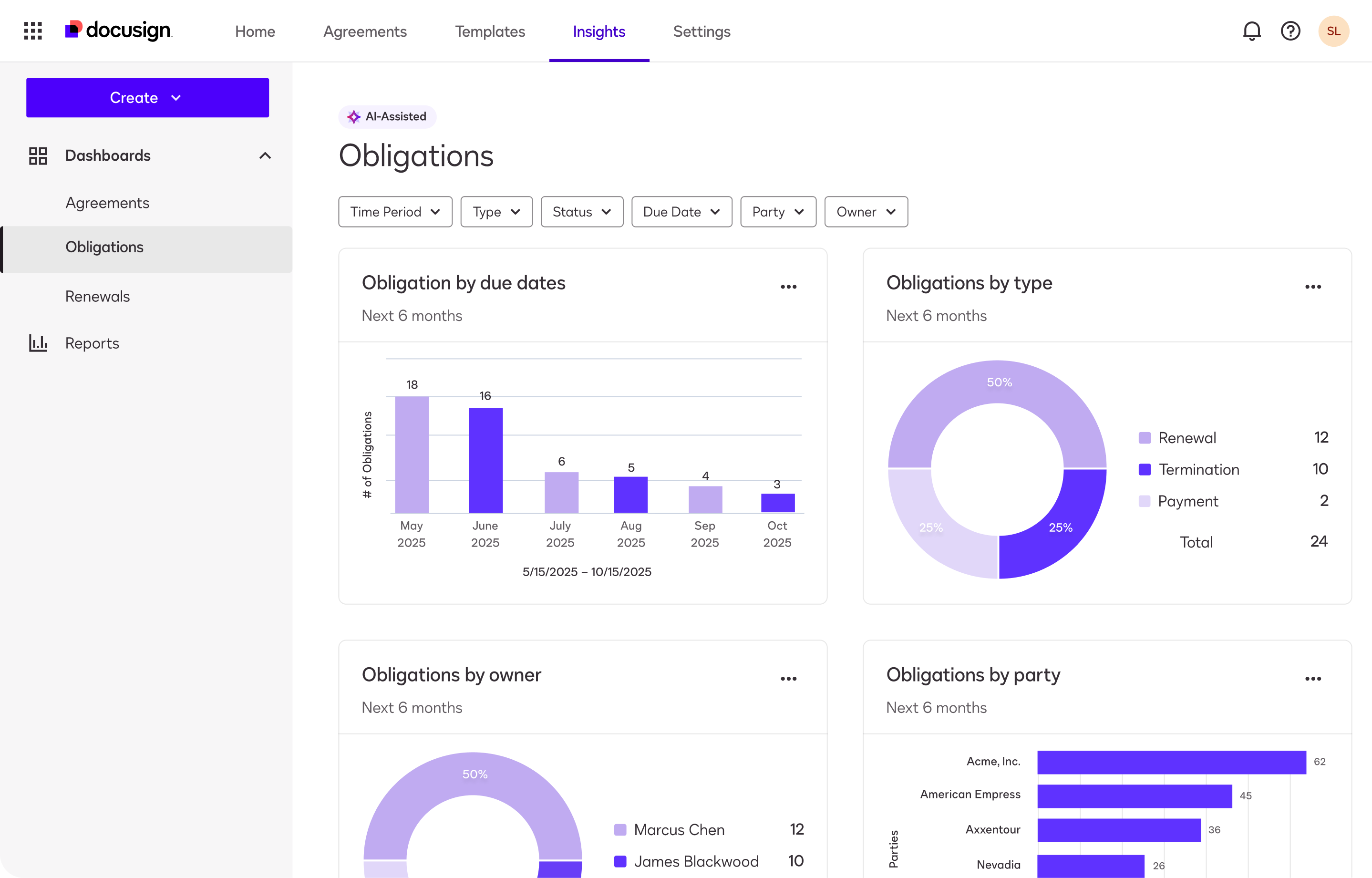 AI
AI
 AI
AI
 AI
AI
Docusign Inc. is applying artificial intelligence to the full lifecycle of creating, reviewing and sharing contracts with enhancements to its Intelligent Agreement Management system being announced today.
The electronic agreement and signature specialist claims nearly 1.7 million customers and more than a billion users in more than 180 countries. It said its AI contract agents can analyze agreements in seconds, intelligently extract text from documents, flag risks and identify issues requiring human expertise to shave months off the contract management process in some cases.
The platform covers the agreement lifecycle from identifying the most urgent tasks and surfacing related agreements to recommending specific language updates to ensure compliance. A new feature can also automate agreement workflows. The model was trained on encrypted, anonymized and aggregated data provided by customer consent.
Docusign’s Iris AI engine can be trained to select the right agreement AI models for specific use cases, create standard contracts from templates, review contracts for risks and omissions and summarize the content of detailed contracts to speed processing.
“Iris supports the entire agreement process,” said Rebecca Denman, vice president of product management. “It is assisting in every step along the way.”
At its core, the platform is intended to help organizations get control over contract proliferation, which saps costly knowledge workers’ time, said Dmitri Krakovsky, Docusign’s chief product officer.
“Many super-well-educated and trained people come to work every day and turn into drones because a master service agreement is sitting in some file share or email box and they can’t find it,” he said. “We talk to lawyers who spend the entire day looking for [a nondisclosure agreement] and ultimately have to go through the embarrassment of calling the customer and asking if they have it.”
Navigator, a unified repository that uses AI to automatically extract data and create a structured implementation of contracts, makes it possible for companies to find documents quickly using semantic search. They can customize AI models to easily understand their own agreements at scale using just a few example contracts for training. There’s also a new dashboard for tracking contractual commitments, deadlines and renewals to protect against missed milestones (pictured).
Navigator also solves for duplication and inconsistencies by extracting data from PDF contracts and identifying differences between document language or versions. “We have a customer who has 50,000 templates,” Krakovsky said. “Imagine searching from them, validating that you have the right one, or accommodating regulatory changes.”
Document tracking reduces the risk of simple oversights such as omitting a Social Security number that can cause documents to bounce back and forth for revisions, ultimately adding weeks to the process, he said.
New tools for contract creation and management use dynamic templates that pull in data automatically. A collaboration space allows sales, procurement, and legal teams to track and manage agreement requests and approvals. Risk assessment recommends language revisions that bring contracts into alignment with company policies and regulations.
“It executes a real-time assessment based on the company playbook and provides clause suggestions so that you can ensure that contract you’re reviewing aligns with your company policies,” Denman said.
For example, if a contract actually doesn’t conform to a business policy against self-renewing contracts, “I can click into the details and it brings me directly to that place in the contract and provides suggestions on how I can make the existing language align with my company policies,” she said. “It also provides a description on a recommendation that has been made so I can quickly insert a comment and make the adjustments.”
Automated risk assessment compares vendor risk scores to see if they’ve changed since the initial the relationship and finds existing agreements with the vendor. “The agent may come back and say that because the vendor risk score has changed and there are two issues related to the existing MSA, it recommends we renegotiate this agreement,” Denman said.
The secure, collaborative environment provides all stakeholders with a single view into multi-step agreements like financial onboarding or healthcare. “Instead of passing documents back and forth through email, it’s a workspace where stakeholders can have broad visibility about where different contracts are so they don’t miss anything,” Krakovsky said.
Docusign is also partnering with Secure Identity LLC’s Clear secure identity platform for identity verification in agreement workflows. The integration gives users a secure verification experience based on snapping a selfie.
The first Docusign AI contract agents will become available in the U.S. by the end of this year with a focus on procurement and sales workflows. FedRAMP Moderate and GovRAMP compliance is expected to be added later this year.
Support our mission to keep content open and free by engaging with theCUBE community. Join theCUBE’s Alumni Trust Network, where technology leaders connect, share intelligence and create opportunities.
Founded by tech visionaries John Furrier and Dave Vellante, SiliconANGLE Media has built a dynamic ecosystem of industry-leading digital media brands that reach 15+ million elite tech professionals. Our new proprietary theCUBE AI Video Cloud is breaking ground in audience interaction, leveraging theCUBEai.com neural network to help technology companies make data-driven decisions and stay at the forefront of industry conversations.